10 Important Jobs Deck Cadets Have To Perform On board Ships
While still in a maritime college, a deck cadet often wonders as to what his shipboard duties exactly are. Though there is no specific guidelines or deck cadet job description, the common answer to this intriguing question at college is that a cadet must assist the deck officers in the day-to-day operations of the vessel.
Maritime books don’t really outline the duties expected from a trainee officer and rather harps on the theoretical aspects of onboard training.
Indeed, there are excellent books on the theory and practice of seamanship (& on deck cadet training) but the practical experience gained as a cadet onboard ship is better than any bookish knowledge.
It is therefore important that deck cadets have a general overview of the duties that are performed when on board ships. Of course, these are general guidelines and the jobs may vary from ship to ship.
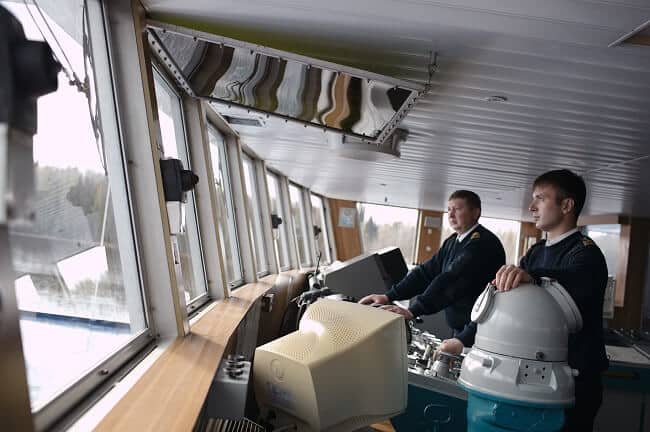
Below mentioned are ten important duties that are required to be performed by deck cadets on almost every type of ship.
1. Tank Soundings
Almost all deck cadets are asked to check tank soundings on a regular basis. Generally taken after the 0400-0800 watch (before or right after breakfast), soundings are very crucial for ensuring the stability of the vessel. The fact that the ship’s stability is dependent on the total ballast being carried, makes a deck cadet realise the high level of responsibility given to him.
Taking soundings must be learnt to the highest degree of precision so that the job becomes easier and executed swiftly. Knowing the depth of all the tanks also saves a lot of time. At ports, soundings are extremely crucial to the loading and/or discharging of the cargo and should not be meddled with at all. Fabricating the readings can be detrimental to the safety of the ship and its crew.
2. Ship Maintenance
All cadets who have served onboard will know that an area within the ship is designated to the deck cadet for maintenance and upkeep. Generally, one deck (or a part of it) of the superstructure is assigned to the cadet. Maintenance of that includes overall cleanliness and reporting of any abnormalities within the area.
3. LSA/FFA Maintenance
Thorough maintenance of the life saving appliances (LSA) and fire fighting appliances (FFA) is extremely important. Generally a part of the 3rd Mate’s duties and responsibilities, this work is assigned to the cadets so that they learn the procedures of noting down expiry dates, carrying out repair work, checking for any defects, emailing the company for ordering new products etc. In the process, a cadet ends up learning a great deal about how each equipment functions and also a lot about the lifeboats, liferafts, pyrotechnics, SOLAS Regulations etc. All such information ends up being extremely useful when appearing for the 2nd Mates examination.
4. Deck Work
Assisting the ship’s bosun in everyday deck work is embedded into any cadet’s daily schedule. This is basically grounding work, seemingly unimportant at the start, but builds the framework for the coming years as an officer. Work on deck including chipping, painting, grinding etc. is carried out to maintain the structural integrity of the deck, along with some rope work (e.g., splicing) that gives cadets the right aspect towards good seamanship.
Also, as all cadets will tell you, the job of stenciling various parts on deck is the universal designated duty of a cadet!
5. Berthing/Unberthing Operations
When a vessel goes alongside (or casts away), it’s normally “all hands on deck”. The entire deck populace is present at their respective stations to get the vessel to berth/cast off close to perfection. A cadet starts out at the stations as a sort of a rating, doing mainly the physical work. As time goes by and experience is gained, his job switches to more of a supervisory nature, wherein the cadet is expected to relay the orders of the Master to the ratings, ensuring that the operation runs smoothly and in order.
6. Pilotage Operations
A cadet’s role during pilotage varies with the time he has spent onboard. Initially, a cadet assists the ratings in rigging the pilot ladder and lowering the gangway for the pilot to board, along with other related processes during pilotage. The process also involves learning, first hand, the precise construction of the pilot ladder as per Regulations (important when appearing for the 2nd Mates examination). Gradually, once the Master deems the Cadet to be relatively well versed with the vessel’s operations, he is called on the Bridge to assist the duty officer with the different pilotage paperwork, e.g. printing out and filling the pilot card, plotting the position, filling the radio log (under supervision), observing the steering etc.
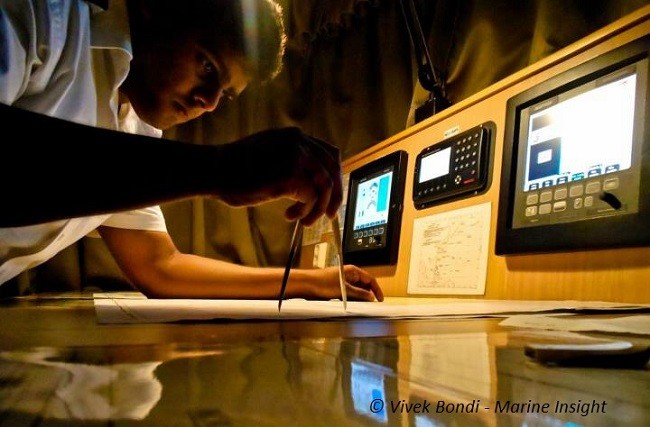
7. Port work and Cargo Operations
Being a trainee officer slated to sail as a 3rd Mate upon completion of the training period, a cadet is expected to be vigilant while in port. Work in port includes assisting the 3rd Mate with paperwork (Bond store, crew declaration etc.), i.e. keeping them stamped, signed and ready with a fair number of photocopies.
Watches also have to be kept in port; this includes monitoring the cargo being loaded/unloaded (involves noting down precise timings of the start and end of loading/unloading, every time it happens). Normally, the cadet is made responsible to keep a tab on the tank soundings with continuous feedback to the duty officer on the portable VHF handheld/ walkie-talkie.
8. ISPS Watch
A very integral part of the port watch, an ISPS watch is pivotal to the security of the ship. With the norms pertaining to ship security getting stringent by the day, the ISPS watch has become one that has to be taken rather seriously.
A cadet is normally assigned to monitor the entry and exit points of the vessel. Usually stationed at the gangway, it is expected from a cadet to keep a log of all the persons entering and leaving the vessel; this includes all shore personnel as well as the ship’s crew (going on shore leave). IDs must be checked and logged in the ship’s ‘Visitor’s Log’. If such a system exists onboard (differs from company to company), a ship’s numbered ID must be provided to keep a track of the person even more precisely. Bags and suspicious objects must be checked thoroughly. A cadet, being an officer in the making, is also expected to usher in various officials (PSC Surveyors, Coast Guard, Medical/Health Inspectors etc.) to the ship’s office. Informing the duty officer of the particulars of the person being brought in is crucial and comes naturally after having spent enough time onboard.
9. Paperwork At Sea
All seafarers will agree that paperwork has increased many times over and so has the stress and irritation that comes with it! A cadet is expected to be a helping hand to the Chief Mate when it comes to the different checklists, familiarisation lists, key logs etc.
Updating of the Muster lists and the cabin key log are generally handed over to the cadet when there are new on signers. Making photocopies of various lists are almost always the sole job of a cadet! (And sometimes the number is extremely large). Not to forget the thing that has become ubiquitous on almost all vessels- The Watch & Rest Hours- to be distributed to all on time; another universally allotted job of the deck cadet.
Although not directly part of mainstream paperwork, the numerous discontinued charts that are used for stencilling are also to be cut out, close to perfection by the deck cadet!
10. Navigation
Perhaps the most important aspect of being a cadet, navigation is the very purpose that the ship is in business and officers/ratings are employed!
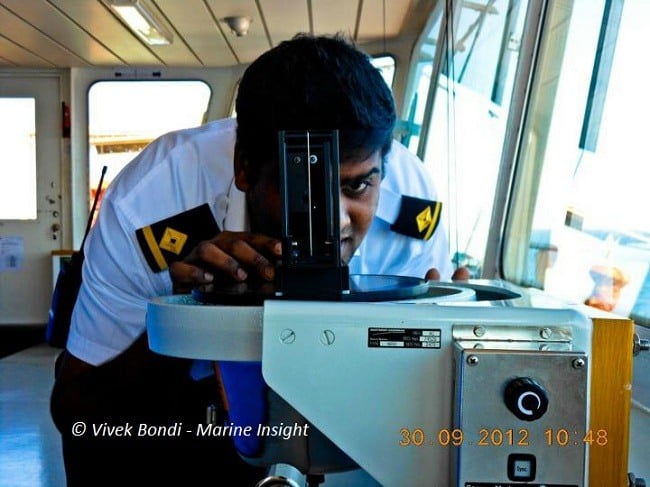
Not having a valid Certificate of Competency (COC), a cadet is naturally not allowed to keep a bridge watch independently. However, under the guidance and supervision of a certified officer (almost always it is the Chief Mate), a cadet is expected to learn the science and art of navigation, which would eventually help him in becoming a successful deck officer. Theoretical knowledge of the COLREGS, Celestial Navigation, Bridge Equipments, Seamanship, Chartwork etc. all culminate into this one grand attempt at safe navigation of the vessel.
Normally, the Chief Mate takes time out during the bridge watches (0400-0800 and 1600-2000) to teach a cadet about the ongoings in the bridge and also tests his knowledge he has received during his deck cadet course on myriad aspects of the merchant navy. Gradually, the Chief Mate and eventually the Master develops a trust factor (provided the cadet is worth the salt), which enables them to delegate work to the cadet.
As daunting as it may seem, cadetship actually is the most fun part of one’s shipping career. With no responsibility at hand and not being answerable under legal bindings, cadetship is the time to learn and imbibe. Everyone that has gone through will look back at their time fondly (except the extreme cases!) and with pride. Donning the uniform as a young 20 something is a matter of respect. Provided a cadet is diligent in his duties, he can be assured that he’ll be respected by all onboard and the time he spends as a cadet will be full of lifelong memories.
You may also like to read –
- How Deck Officers Can Use NP 294 to Keep Admiralty Products Up-To-Date?
- A New Seamanship Practice: Cyber-Discipline
Want to learn duties of deck officers at each level? Checkout our ebook “A Guide to Become Successful Deck Officer”
Do you have info to share with us ? Suggest a correction

About Author
Shilavadra Bhattacharjee is a shipbroker with a background in commercial operations after having sailed onboard as a Third Officer. His interests primarily lie in the energy sector, books and travelling.
Latest Marine career Articles You Would Like:
Subscribe To Our Newsletters
By subscribing, you agree to our Privacy Policy and may receive occasional deal communications; you can unsubscribe anytime.



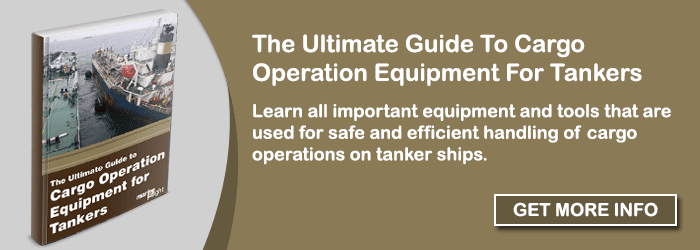

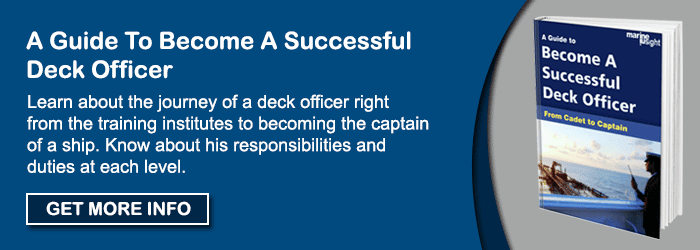



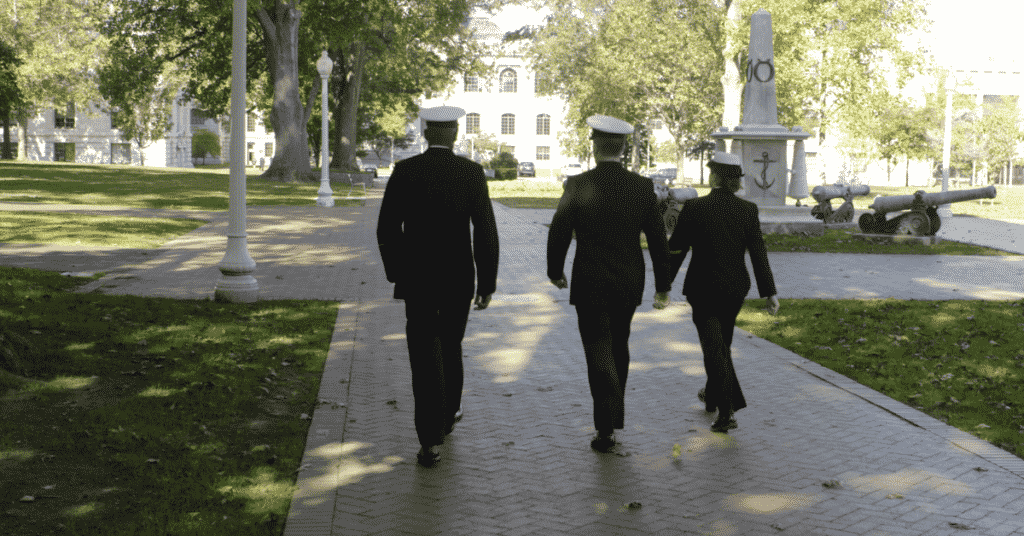

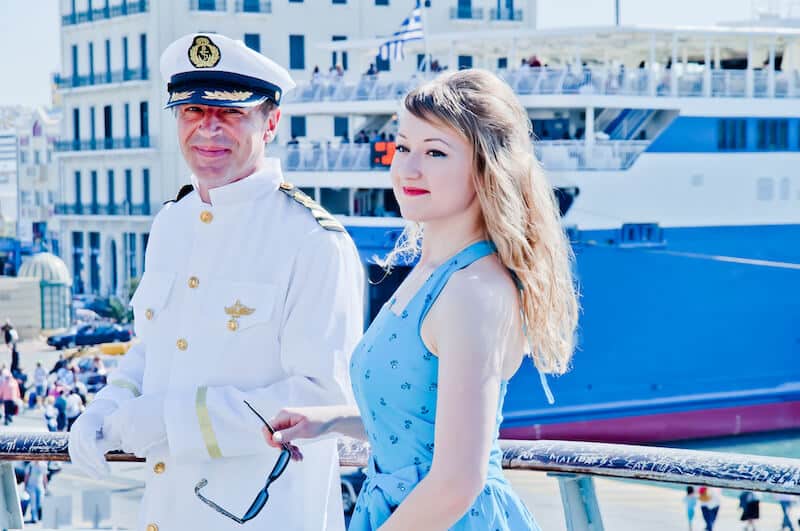




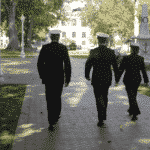
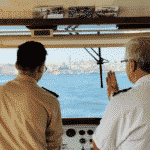

good knowledge
I love to know more about this page
Good advice for cadets , even ordinary seaman.
I am able body seaman. I had been coxswain certificate. My ambition is coxswain. ?.
This is a good site for upcoming seamen but one thing i notice is,books and guides are mostly for deck officers.I’d like to know if there is a guide to being a successful chief engineer as well and important jobs for engine cadets on-board. thank You!
it is good that websites like this clears our doubts about our career at sea. thanks!
I really like this web site to provide us lot of knowledge regarding the shipping jobs and career.
NICE AND WELL PERFORMANCES TO BECOME A SEAMAM ITS NOT A JOKE.GOD WILL SAVE YOU ON THE SEA.
I love ALL the articles/advices given here
And I usually make sure I check this site everyday.
As a young(fresh) seafarer,I’ve really learned a lot from your e-books…
Please,keep the good work up
thank you for the wonderful lessons sirs.
It helped me a lot nice knowledge i am cadet completing my education in dns at t.s. chanakya….
This article briefly describe the steps to reach a successful training year as a Cadet! After a while you learn for yourself how every one of these activities are crucial for shipboard work. All this lines bring me good and bad memories of those initial days
it’s a very good site to get more good information…………………………
I want to know if it is easy for a coxswain student to get a place on-board as a deck cadet?
The above is true in case of cadets having normally sane senior officers.
I have seen instances when cadets have had to stand for 20 hours at a stretch outside captains cabin waiting for any order to be given from him as regards to lighting his pipe, or getting his meals for him etc.
And no one can do a jack about it.
There have been even pretty sad and horrendous cases of sexual abuse by chief officer, and or the master, and in some cases even by the deck crew of cadets.
So, please cover all aspects and dont show only the good points of cadets life at sea.
is it effective for the deck cadet to become thirdmate directly after passing the board exam or he must started from being a rating?
Thanks professors for the lesson and the daily insight update,i glad because these books is hard to found but with these site am glad to recieve what you give out,thanks and be blessed.
I want to join …..merchant navy….
9132790508… Contact me on this no …
Good day! I am a cadet(from Ukraine,18 years), with a proficient knowledge of English and an average score, in search of the first practice in the post DECK CADET.
I have:
– Seaman’s Seagoing Service Record Book
– travel/foreign passport
– seaman’s passport
Certificates of :
– security related training and instruction for all seafarers
– familiarization basic safety training and instruction for all seafarers
– proficiency in survival craft and rescue boats other than fast rescue boats
– designated security duties of shipboard personnel
– fire fighting
– first aid
I’m ready to start work in May 2015 .
I would proudly accept the opportunity, and I would be very grateful.
My phone number: +380994547118 . E-mail: artemmoskalenko0@gmail.com
Thank you for your attention.
)
I am applying cadet right now..i want to knoq what is the purpose of cadet on ship..and tp know what is refrigeration.i dont know bec. I have not yet finished my ojt on board.plz answer immediatly because i have an interview tom.. Plz help me..
Hello! I’m an Higher National Diploma (H. N D) holder in port and Shipping Administration, and a National Diploma (N.D) in nautical sceince. Pls I will be greatful if God use some one here to change my story by offering me a job. Pls contact me with this number +232 76309797 or E-mail : princesolo1987@gmail.com, God bless you as you help.
This is an interesting information.
Glad you liked it!
Well said
i m experance
deck cadet
I was about to search important questions for our ship’s visit tomorrow,but unintentionally I went on this site, I tried to read on the first few sentences and I found it quite interesting,until I just finished reading it.
Thanks for this! I learned something important especially for me.
A couple of days from now I’ll be already on board for my first vessel assignment.(as a deck cadet) ^_^
@Will : Glad you find the information useful. Best of luck for your sailing.
I’m gland to know more about deck cadet on baord ship, according to this site it we help a lot of cadets. Although am a cadet and am search for job you help me out of my situation
plz contact me on 7240766512
good side
I’m really glad and proud to see deck cadet officer and I am so much interested to join in merchant or navy.. please do
contact me in this No. 8414977418
Hi
I m aryan kumar . i have done deck cadet course , now i m searching job plz help me to find job ……….. my email id – aryankaushal786786@gmail.com or contact at 9760589750
Sir i want join deck cadet what will i have to do for deck cadet
@Saif: Check this article- https://www.marineinsight.com/careers-2/4-ways-to-become-a-deck-officer-in-merchant-navy/
like job
hello i have a BSC in pharmacology and I’m currently on rating as a deckhand but haven’t gone on board a ship before. please what steps do i need to take to further my career in any country?
What are the minimum eligibility to become a deck cadet ?
I pass the 10th exam with 86% and 12th with 80 % while I have take humanities in 12th is I eligible for this course.
Pls reply soon
What are the minimum eligibility for become a deck cadet ? I have pass the 10th with 86% and 12th with 80 % while I have taken humanities .Is I am eligible for this course.
Usually every deck cadet have standard practical plan. Every Deck Cadet is unicum, but he is in future will be Navigational officer. For this it is very importent to take practical things as navigational officer, check the marine skills and knowledges.
What are the duties of officers on watch onRo Ro passenger ferries related to safety
I love the post. ..M navy is very good job
Mai Bsc final kar chuka hu physic And math sa mera liya koi accha job marchant nevi me ha
Glad you liked it.
What should be top 10 qualities & responsibilities for deck cadet
i want to work in crucial ship. how can i join??? but i do not have skills on working on ship
good work but i want to join
Where can I get a copy of the book “guide to be a successful deck officer”?
Hi I’m parent of gp rating student. Please contact me on my phone number 9762476796 /8308797513 whatsapp.facing issues so please contact soon .
@Manjili: Please use our forums to ask your queries in detail- https://forums.marineinsight.com
Anish , it’s a very nice insight of duties and training by a deck cadet it’s real good effort and compilation.